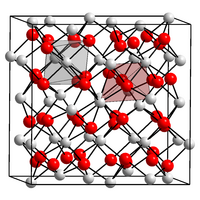Gadolinium (III) oxide
| Crystal structure | ||||||||||||||||
|---|---|---|---|---|---|---|---|---|---|---|---|---|---|---|---|---|

|
||||||||||||||||
| __ Gd 3+ __ O 2− | ||||||||||||||||
| General | ||||||||||||||||
| Surname | Gadolinium (III) oxide | |||||||||||||||
| other names |
|
|||||||||||||||
| Ratio formula | Gd 2 O 3 | |||||||||||||||
| Brief description |
hygroscopic white solid |
|||||||||||||||
| External identifiers / databases | ||||||||||||||||
|
||||||||||||||||
| properties | ||||||||||||||||
| Molar mass | 362.49 g mol −1 | |||||||||||||||
| Physical state |
firmly |
|||||||||||||||
| density |
7.41 g cm −3 |
|||||||||||||||
| Melting point |
1900-2330 ° C |
|||||||||||||||
| solubility |
|
|||||||||||||||
| Refractive index |
1.96 |
|||||||||||||||
| safety instructions | ||||||||||||||||
|
||||||||||||||||
| As far as possible and customary, SI units are used. Unless otherwise noted, the data given apply to standard conditions . Refractive index: Na-D line , 20 ° C | ||||||||||||||||
Gadolinium oxide is the oxide of the rare earth metal gadolinium .
history
Gadolinium is one of the elements of the ytter earths in the periodic table and was found spectroscopically in 1880 by Jean Charles Galissard de Marignac in didymium and gadolinite . In 1886 he produced gadolinium oxide as a white oxide from Samarskite and named it Y from Samarskite . In the same year Paul Émile Lecoq de Boisbaudran also produced gadolinium oxide and named the new element gadolinium after the discoverer of the mineral gadolinite, the Finnish chemist Johan Gadolin .
properties
Gadolinium oxide is an odorless white solid that is insoluble in water. The compound is hygroscopic and absorbs moisture and carbon dioxide from the air. It comes in three modifications (A, B, and C types). The A-type has a hexagonal crystal lattice, the B-type is a monoclinic distortion of the A-type, and the C-type has an isomorphic-cubic manganese (III) oxide structure. At room temperature it crystallizes in the C-type, the other two structures are only stable at higher temperatures.
use
Gadolinium oxide is used as a host lattice for phosphors , for the production of fluorescent powders , for the production of special optical glasses with a high refractive index , in control rods of nuclear reactors and in pharmaceutical diagnostics ( contrast media ). Furthermore, gadolium oxide is substituted for the production of magneto-optical memories in the form of GGG (Gallium-Gadolinium-Garnet Gd 3 Ga 5 O 12 ) or partly as GGCMZ (Gallium-Gadolinium-Calcium-Magnesium-Zirconium-Garnet (Gd, Ca ) 3 (Ga, Mg, Zr) 5 O 12 ) are used.
Individual evidence
- ↑ a b c d e ESPI-Metals: Gadolinium Oxide , accessed December 7, 2019
- ↑ Reade: Gadolinium oxide ( Memento of the original from November 29, 2010 in the Internet Archive ) Info: The archive link was automatically inserted and not yet checked. Please check the original and archive link according to the instructions and then remove this notice.
- ↑ David R. Lide (Ed.): CRC Handbook of Chemistry and Physics . 90th edition. (Internet version: 2010), CRC Press / Taylor and Francis, Boca Raton, FL, Index of Refraction of Inorganic Crystals, pp. 10-246.
- ↑ a b Data sheet Gadolinium (III) oxide, REacton®, 99.999% (REO) from AlfaAesar, accessed on December 7, 2019 ( PDF )(JavaScript required) .
- ↑ Jian-Ping Zhoua, Chun-Lin Chaia, Shao-Yan Yanga, Zhi-Kai Liua, Shu-Lin Songa, Yan-Li Lia, Nuo-Fu Chen: Properties of high k gate dielectric gadolinium oxide deposited on Si (100) by dual ion beam deposition (DIBD). Journal of Crystal Growth, Volume 270, Issues 1-2, September 15, 2004, Pages 21-29 doi: 10.1016 / j.jcrysgro.2004.05.114
- ↑ Patent DE2805914 : Gadolinium oxide luminophore activated with bismuth - produces visible light when excited by ultraviolet or X = rays, used in fluorescent screens. Published on August 23, 1979 , inventor: Heinz Degenhardt.
- ↑ Dotarem solution for injection. In: pharmazie.com. Accessed on July 27, 2016 (PDF; 38 kB).
- ↑ Treibacher.com: Gadolinium Oxide ( Memento from January 2, 2007 in the Internet Archive )
- ↑ Patent DE3607345 : Magneto-optical light switching element and method for its production. Published on September 10, 1987 , inventors: Peter Hansen, Claus-Peter Klages, Klaus-Peter Schmidt, Wolfgang Tolksdorf, Klaus Witter.
